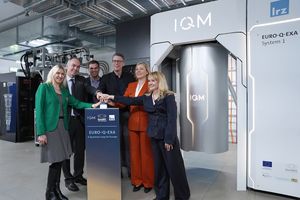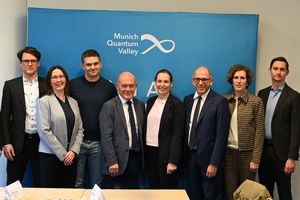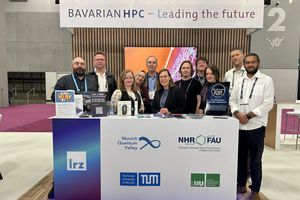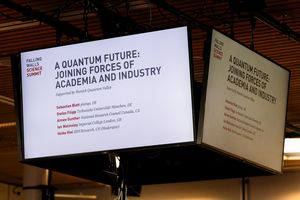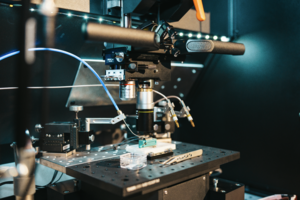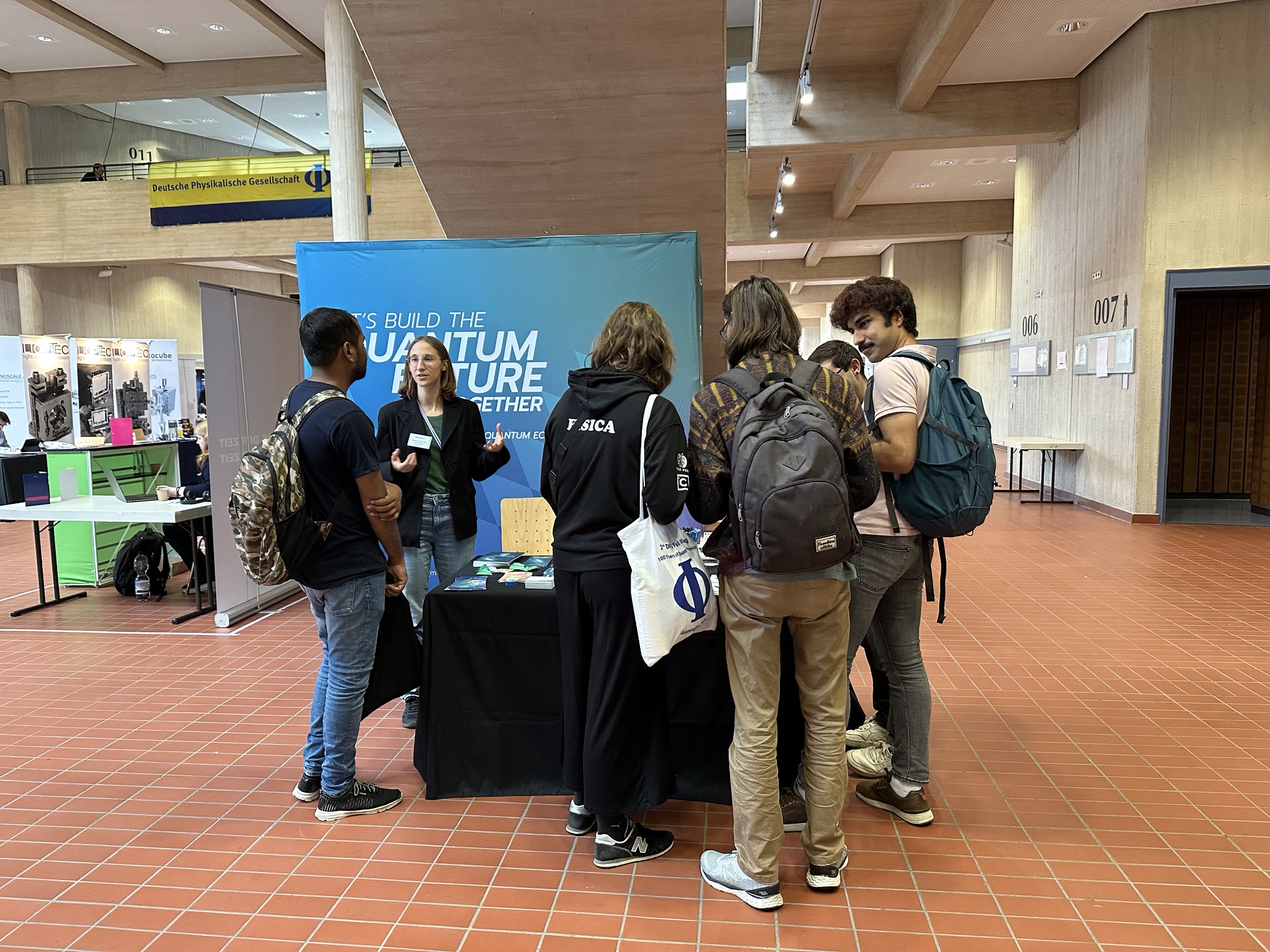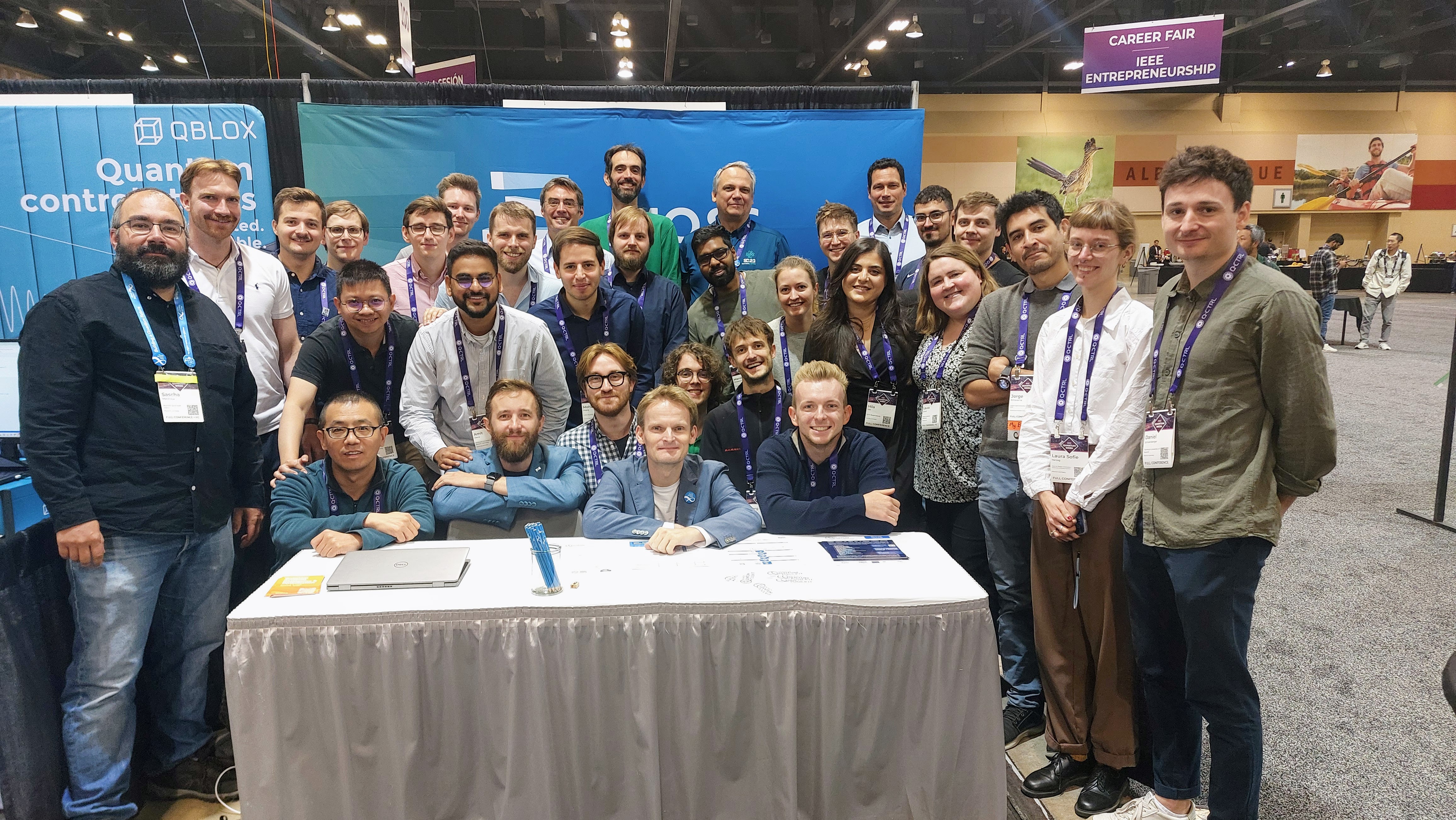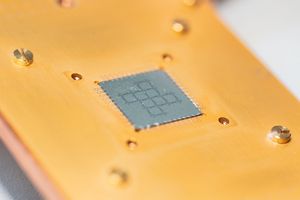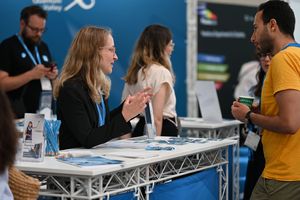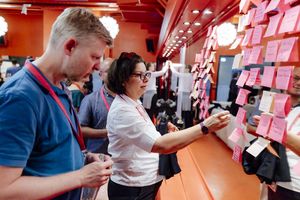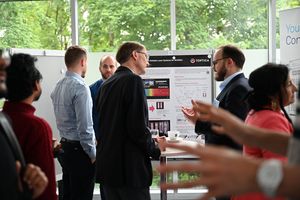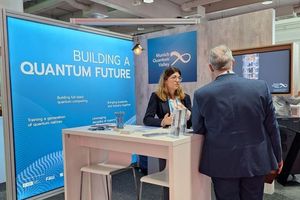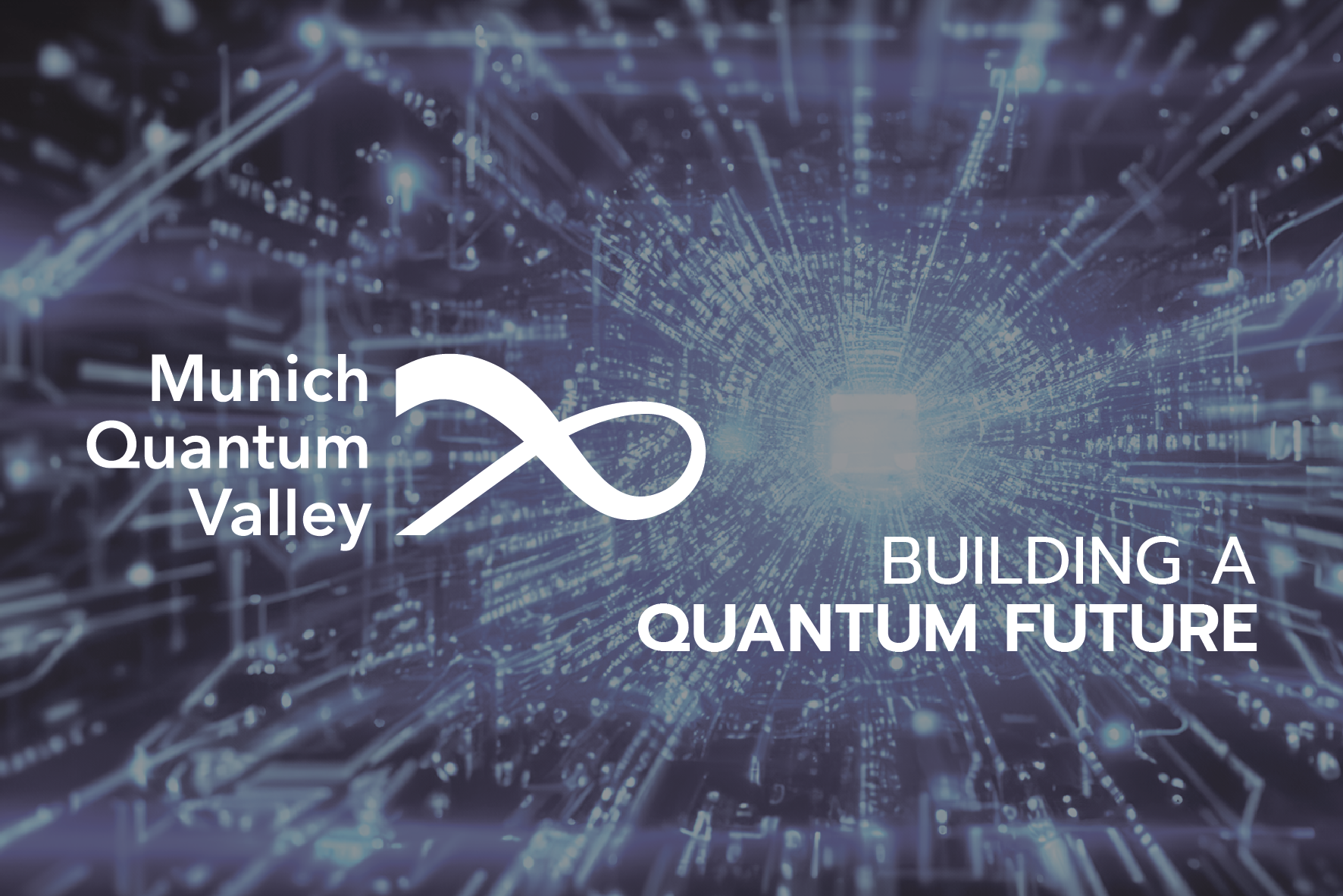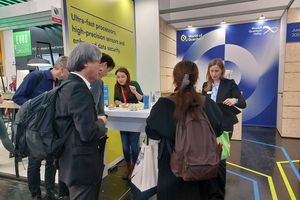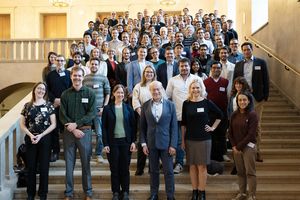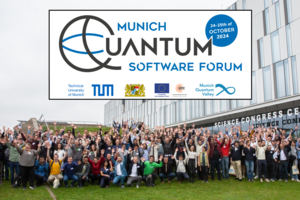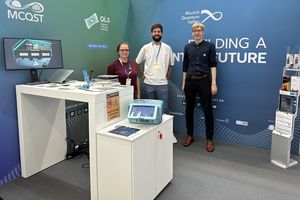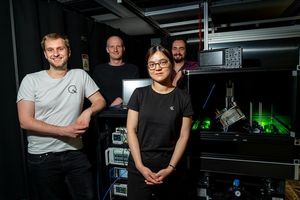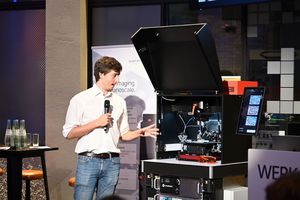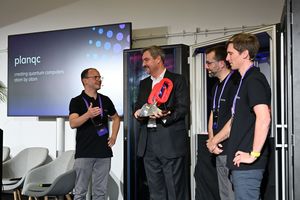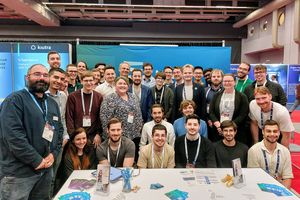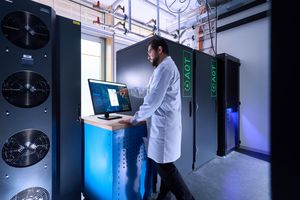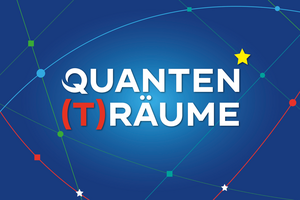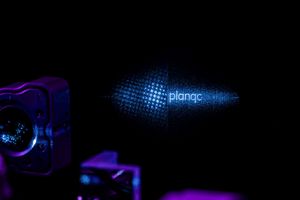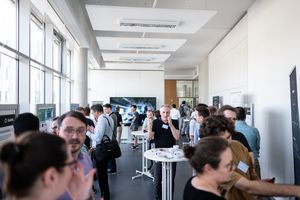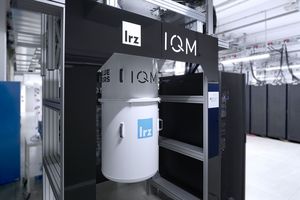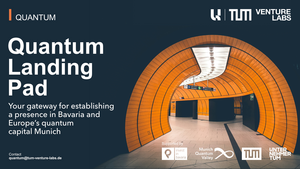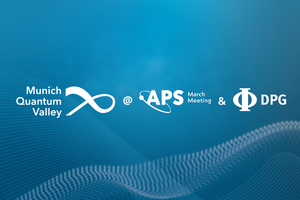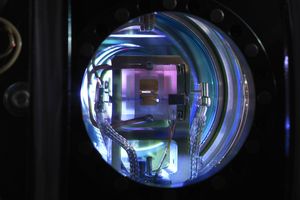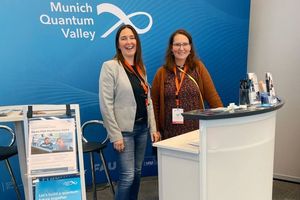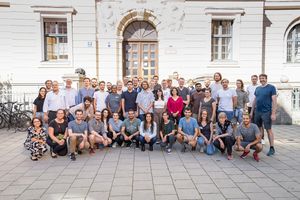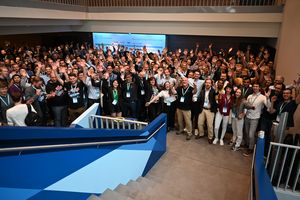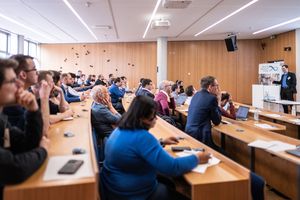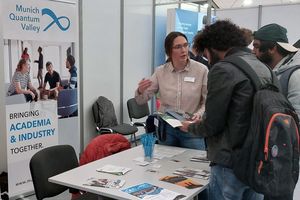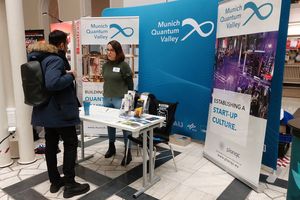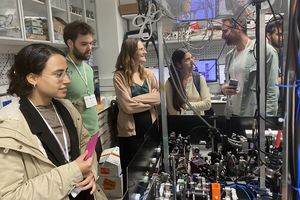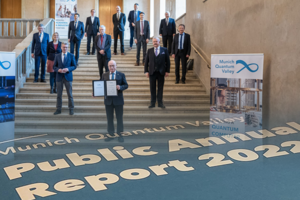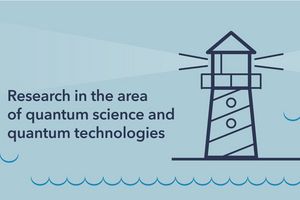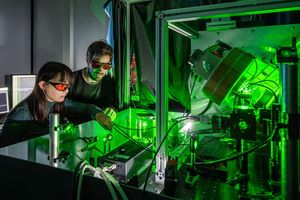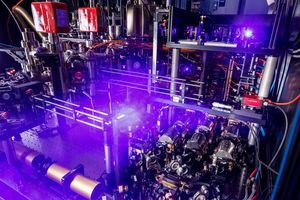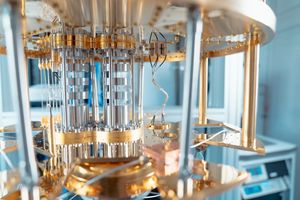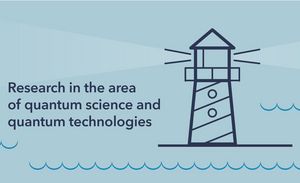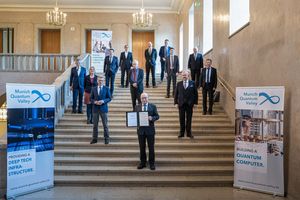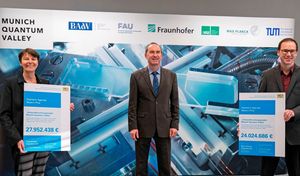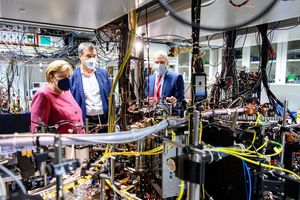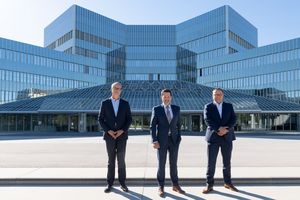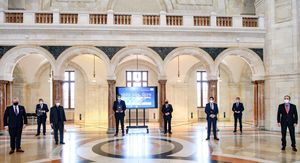
News
First European quantum computer for Germany: Euro-Q-Exa begins operation at Leibniz Supercomputing Centre
Today, Euro-Q-Exa, the first European quantum computer of the EuroHPC Joint Undertaking in Germany, went into operation at the Leibniz Supercomputing Centre (LRZ). The system has 54 qubits and is to be supplemented by an additional system with more than 150 qubits by the end of 2026. Connected to the LRZ's supercomputer, Euro-Q-Exa is now available to researchers in Europe and is intended to advance technical independence in quantum computing.
Forward-looking exchange between Basque Quantum and Munich Quantum Valley
On 27 and 28 November 2025, a high-level delegation from the Basque government visited Munich Quantum Valley (MQV). The delegation met with MQV representatives from management and science to identify scientific and strategic interfaces between the two quantum hubs and explore potential areas of cooperation. The initial meeting has already generated concrete ideas for future joint projects.
MQV at the SC25
From 16 to 21 November, Munich Quantum Valley (MQV) attended the International Conference for High Performance Computing, Networking, Storage, and Analysis (SC25) in St. Louis, Missouri.
'A Quantum Future: Joining Forces of Academia and Industry' at Falling Walls Science Summit
At the Falling Walls Science Summit in Berlin, Munich Quantum Valley (MQV) brought together representatives from quantum innovation and technology to discuss how science and industry can collaborate to accelerate development and promote technology transfer.
MQV to receive the 2026 Technology Transfer Award of the German Physical Society
Munich Quantum Valley (MQV), the TUM School of Natural Sciences at the Technical University of Munich (TUM-NAT), and the Munich-based startup QuantumDiamonds will receive the prize for their pioneering development of innovative quantum sensors for fault analysis and measurement technology in the semiconductor industry.
MQV at the DPG Fall Meeting in Göttingen
Last week, the second DPG Fall Meeting took place at Georg August University in Göttingen under the motto “100 Years of Quantum Physics.” Munich Quantum Valley (MQV) was represented with a booth at the industry and book exhibition.
Munich Quantum Valley at IEEE Quantum Week 2025
The IEEE International Conference on Quantum Computing and Engineering (QCE) took place in Albuquerque from 31 August to 5 September. Munich Quantum Valley (MQV) had a stand at the event and made numerous contributions once again.
MQV institutes and start-ups play key role in EU’s first pilot line for superconducting quantum chips
The European Union has approved SUPREME, a major new pilot line to industrialize superconducting quantum chip fabrication, coordinated by VTT and funded through the EU Chips Joint Undertaking. As part of this initiative involving 23 partners across eight EU member states, one of the three central fabrication sites will be hosted in Germany, specifically in Garching and the Munich area, supported by a strong consortium of German research institutions and technology developers.
World of Quantum 2025: Fantastic atmosphere in the quantum community
From June 24 to 27, 2025, World of Quantum, the world's largest trade fair for quantum technology, took place in Munich. Munich Quantum Valley (MQV) made a strong showing with its own stage program at its booth and an expanded ecosystem area together with member institutions, industry partners, and start-ups.
AFQC 2025: IMPACT
Together with the DLR Quantum Computing Initiative (QCI), Munich Quantum Valley (MQV) presented AFQC 2025: Impact! More interaction, concrete goals and results, and a real impact on the ecosystem to create a more effective, relevant forum for exchange – high expectations that the event was able to fulfill.
MQV Supplier Workshop 2025
Last week, Munich Quantum Valley (MQV) invited industry partners and researchers to the second MQV Supplier Workshop in Garching to constructively connect representatives from industry and science within the MQV ecosystem and strengthen the quantum community.
Munich Quantum Valley at the Hannover Messe 2025
As in the last two years, Munich Quantum Valley (MQV) was an exhibitor at the Hannover Messe. From March 31 to April 4, visitors to the stand were given the opportunity to find out more about quantum research in Bavaria.
Bavarian state government sets the course for the further development of Munich Quantum Valley
At its cabinet meeting on 11 February, the Bavarian state government reaffirmed its commitment to Munich Quantum Valley (MQV), thereby setting a bold course for its continued expansion. This decision paves the way for MQV’s overarching mission: to develop and operate cutting-edge quantum computers for real-world applications, in close collaboration with visionary start-ups and leading industrial partners.
MQV at the electronica 2024
From 12 to 15 November 2024, Munich Quantum Valley (MQV) took part in electronica with a joint booth with the “World of Quantum”. With 3,480 exhibitors spread across 18 exhibition halls and around 80,000 visitors this year, electronica is the leading trade fair and conference for the entire spectrum of electronics.
Symposium "Towards applications of quantum computing": networking science and industry
On 11 and 12 November, the symposium "Towards applications of quantum computing" took place. The event was organized by Munich Quantum Valley (MQV) together with the Fraunhofer Institute for Cognitive Systems IKS, supported by Bayern Innovativ and QUTAC. The symposium brought together representatives from industry and science working on quantum computing applications with hardware and software developers.
Munich Quantum Software Forum 2024
On 24 and 25 October 2024, the Munich Quantum Software Forum took place for the second time. Organized by the Chair of Design Automation at the Technical University of Munich, the event brings together the "who's who" of quantum computing software. Once again, the extremely high attendance shows the great interest of the community.
Munich Quantum Valley at Quantum Effects
Once again, Munich Quantum Valley was present at the Quantum Effects trade fair in Stuttgart.
Quantum sensor technology for cancer monitoring wins Medical Valley Award
As part of the 'Munich Quantum Valley' Lighthouse Project IQ-Sense, researchers at the Technical University of Munich have developed a new method for the optical detection of MRI signals using diamond-based quantum sensors. In collaboration with the Hospital of the Ludwig-Maximilians-Universität München, the researchers now want to make their method applicable for clinical use in the field of cancer monitoring, for which they have received the Medical Valley Award.
Quantum Diamonds presents new device for optimizing chip production
Last week, Quantum Diamonds hosted the official launch of its new device. The start-up from the Munich Quantum Valley ecosystem presented its new, high-resolution quantum microscope to an invited audience of investors and supporters from industry and academia at its facilities in Werk 1 of Munich's Werksviertel.
Planqc opens its new headquarters in Garching
Yesterday, planqc opened its new premises in Garching. Together with representatives from politics and industry as well as investors, the start-up, which is the first start-up to emerge from Munich Quantum Valley (MQV), celebrated this important step.
Munich Quantum Valley at the IEEE Quantum Week 2024
From 15 to 20 September 2024, the IEEE International Conference on Quantum Computing and Engineering (QCE) took place in Montreal. This year, Munich Quantum Valley (MQV) was represented with a stand in addition to numerous contributions.
Ion-trap quantum computer ready for novel research and development at the LRZ
The ion-trap quantum computer from Alpine Quantum Technologies, procured by the Leibniz Supercomputing Centre and Munich Quantum Valley, is now operational at LRZ's Quantum Integration Centre, making it the first of its kind in a computing center.
Quantum dreams and spaces for the future
MQV is a partner in the joint project Quanten(t)räume – a play of German word quantum spaces and quatum dreams – funded by the Federal Ministry of Education and Research (BMBF). Starting next Tuesday, the project will offer regular opportunities to find out about the state of research in the field of quantum technologies, ask questions to the experts and contribute your own ideas for useful applications.
planqc secures €50 million in Series-A funding
MQV start-up planqc has just announced the successful closing of its first significant round of venture capital funding.
Connecting industry and academia: Looking back at the MQV Supplier Workshop
Yesterday, Munich Quantum Valley (MQV) invited industry partners and researchers to the first "MQV Supplier Workshop" in Garching. The event aimed to constructively connect representatives from industry and academia within the MQV ecosystem and strengthen the quantum community.
Leibniz Supercomputing Centre hosts Germany's first hybrid quantum computer
At the Leibniz Supercomputing Centre, a quantum computer based on superconducting qubits has been successfully connected to the SuperMUC-NG supercomputer. Initial tests show that the two technologies work together, enabling hybrid quantum computing. Today, the system has been formally unveiled.
planqc selected to join World Economic Forum as Technology Pioneer 2024
As announced today, the MQV start-up has been selected to join the World Economic Forum’s Innovator Communities in the Technology Pioneers 2024 Cohort.
Quantum Landing Pad launched to help international quantum start-ups establish themselves in Munich/Bavaria
In an exciting development for the quantum technology sector in Munich and Bavaria, Munich Quantum Valley, Invest in Bavaria and TUM Venture Lab Quantum jointly launch the Quantum Landing Pad.
Munich Quantum Valley at the Spring Meetings 2024
This year, Munich Quantum Valley (MQV) will once again be exhibiting at the March Meeting of the American Physical Society (APS) in Minneapolis and at the Spring Meetings of the German Physical Society (DPG) in Freiburg and Berlin.
A trapped-ion quantum computer for Munich Quantum Valley
In cooperation with Munich Quantum Valley, the Leibniz Supercomputing Centre is procuring a quantum computer based on trapped-ion technology.
Munich Quantum Valley at Quantum Effects and EQTC
The trade fair season is slowly coming to an end, but also in October Munich Quantum Valley was present at two events in Germany.
Successful closure of the Quantum Future Academy 2023 in Munich and Berlin
The Quantum Future Academy (QFA) brings together young talents in the field of quantum technologies. The first part of the binational event took place in Israel in February. The second week-long academy in Germany concluded this year's program this past week.
Superconducting Qubits and Algorithms Conference 2023 in Munich
Around 400 people from all over the world participated in the second edition of the Superconducting Qubits and Algorithms (SQA) Conference taking place 29 August - 1 September 2023. The conference was jointly organized by IQM Quantum Computers, Technical University of Munich and Munich Quantum Valley.
MQV and IBM Quantum present quantum technologies from research to application at the World of QUANTUM
Munich Quantum Valley (MQV), a leading German quantum hub, and IBM Quantum will host experts from academia and industry to present at their joint World of QUANTUM program: "Quantum Technologies: From Research to Application". The full-day program will take place 29 June 2023 as part of the World of QUANTUM fair in Munich (27–30 June 2023).
Symposium "Applications of Quantum Computing" in Munich
Munich Quantum Valley brings together experts from academic and industrial research to discuss issues related to the potential applications of quantum computing.
Quantum Computing meets Cyber Security: Lively Exchange at Symposium in Garching
On Friday, 12 May, the symposium "Quantum Computing meets Cyber Security" took place in Garching. Munich Quantum Valley together with the University of the Bundeswehr Munich (UniBW) and the Ludwig-Maximilians-Universität München (LMU) invited experts to discuss cyber risks in the age of quantum computers.
Munich Quantum Valley at the DPG Spring Meeting of the Condensed Matter Section
Munich Quantum Valley was represented with a booth at the DPG Spring Meeting of the Condensed Matter Section (SKM) as part of the Exhibition of Scientific Instruments and Literature from March 28 to 30.
Presenting bavarian quantum research at home and abroad: Munich Quantum Valley at the DPG and APS conferences
Munich Quantum Valley took part in two conferences in the first week of March: At the DPG Spring Meeting of the Atomic, Molecular, Quantum Optics and Photonics Section (SAMOP) in Hannover as well as at the March Meeting of the American Physical Society (APS March Meeting) in Las Vegas, MQV presented itself with a booth.
Quantum Computing meets Cyber Security: Symposium in Munich brings experts together
Quantum computers could solve problems beyond the capabilities of current classical computers. In parallel, powerful quantum technologies pose a new threat to security systems. The symposium Quantum Computing meets Cyber Security brings together experts to discuss cyber security issues.
Quantum Future Academy 2023: Young researchers visit Israel
The Quantum Future Academy (QFA) is a bi-national event that brings together students from Israel and Germany in two week-long academies on quantum technologies. The first part of the program in Israel takes place this week.
Looking back at the first year
Today we celebrate the first anniversary of the foundation of the Munich Quantum Valley e.V. and look back on a successful year together with the Scientific Director of MQV, Prof. Rainer Blatt.
On this occasion, we are also releasing our first public annual report.
Call for company-driven Lighthouse Projects for applications in the field of quantum technologies
As part of the Bavarian State Government's Hightech Agenda Plus, the Bavarian State Ministry of Economic Affairs, Regional Development and Energy (StMWi) supports innovative, company-driven collaborative projects within MQV.
Leibniz Supercomputing Centre becomes German host for one of the six first European Quantum Computers
Earlier this week, the European High Performance Computing Joint Undertaking (EuroHPC JU) announced that the Leibniz Supercomputing Centre (LRZ) will be one of six sites to host the first European quantum computers.
Nearly 17 million euros funding for Lighthouse Projects
With funds from the Hightech Agenda Bavaria, the Free State of Bavaria is supporting five basic-research projects in the field of quantum sciences with a total of about 17 million euros as part of the Munich Quantum Valley initiative. Acknowledging the expertise available at universities and research institutions throughout Bavaria, the interdisciplinary and cross-university Lighthouse Projects promote Bavaria's leading role in the field of quantum technologies.
Max-Planck scientists found planqc to build highly scalable quantum computer
Quantum computing startup planqc today announced a financing round of EUR 4.6 million led by UVC Partners and Speedinvest. With this funding, planqc will develop a highly scalable quantum computer operating at room temperature that is based on atoms trapped in optical lattices. planqc was founded by a team of scientists from the Max-Planck-Institute of Quantum Optics and Ludwig-Maximilians-University Munich and is the first startup to emerge from Munich Quantum Valley, one of the leading quantum technology hubs in Europe.
Around 20 million euros for new professorships in Bavaria
The universities in Augsburg, Würzburg, Erlangen-Nuremberg and Munich, as well as the technical universities of applied sciences in Regensburg and Nuremberg, will receive around twenty million euros in funding from Bavaria's High-Tech Agenda to enable them to further strengthen their profile in quantum sciences and quantum technologies.
Fit for quantum: Around one million euros for teaching in quantum technology
Making young scientists fit for quantum technologies: The universities in Augsburg, Bayreuth, Erlangen-Nuremberg, Munich, Regensburg, and Würzburg will each receive around 144,000 euros in funding from the High-Tech Agenda Bavaria.
Call for Lighthouse Projects
The call for Lighthouse Projects for research, development and applications in the area of quantum sciences and quantum technologies is now open. The Bavarian State Ministry of Economic Affairs, Regional Development and Energy and the Bavarian State Ministry of Science and Arts funds so-called Lighthouse Projects as a part of the MQV initiative. These projects should use innovative concepts to cover a broad range of quantum sciences and quantum technologies.
Foundation of the Munich Quantum Valley e.V.
Just one year after the Bavarian state government issued its declaration of intent, the founding document was signed ceremonially at the Bavarian Academy of Sciences and Humanities to mark the formal establishment of the Munich Quantum Valley as a registered association. Supplementing the funding of 300 million euros from Bavaria’s Hightech Agenda the initiative’s members have already raised federal funds totaling more than 80 million euros.
Minister Aiwanger hands over funding to FhG and MPG institutes
The Bavarian Minister of Economic Affairs Hubert Aiwanger has handed over funding certificates totaling 52 million euros for the development of a Bavarian quantum computer.
"It’s so great to see the passion, the verve, with which the work is done here“
German Chancellor Angela Merkel and Bavarian Prime Minister Markus Söder are delighted by their impressions into research and networks at MPQ and express their further support.
Quantum research could be the spring of the next big technological revolution and a seed for wealth. A good reason for German Chancellor Angela Merkel and Bavarian Prime Minister Markus Söder to visit the Max-Planck-Institute of Quantum Optics in Garching near Munich, one of the top places in quantum research in the world, to see the current state of science and its prospects for the future. The State of Bavaria has recently funded the new Munich Quantum Valley initiative with 300 million euros, while the German Federal State provides 2 billion for quantum research as part of its economic stimulus package. The MPQ plays a central role in this development due to its world-renowned expertise and excellent international networks.
BMW supports new TUM endowed chair with 5.1 million euros
The BMW Group will support future research on quantum computers at the Technical University of Munich (TUM). The contract establishing the endowed chair for Quantum Algorithms and Applications ("Quantenalgorithmen und -anwendungen") was signed by TUM president Thomas F. Hofmann, BMW AG Board of Management member Frank Weber and BMW AG CIO Alexander Buresch.
Munich Quantum Valley kicks off
Bavaria's leading scientists and universities kick off a new research initiative to promote quantum science and develop new quantum technologies. The Free State of Bavaria is supporting the project with 300 million euros.
